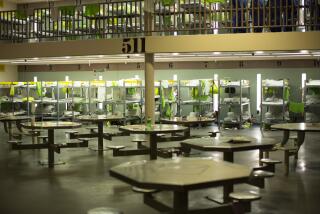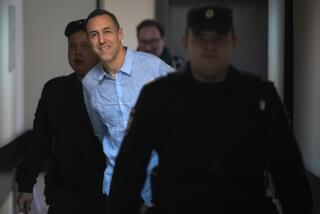From Penthouse to Detention Center: A Media Mogul’s Fall From Grace
- Share via
Two years ago, Jean-Marie Messier slept in a $17-million penthouse on New York’s Park Avenue.
Monday night, he slept on a mattress on the floor of a tiny room inside a detention center in Paris after a day of interrogations by France’s financial investigative brigade.
“It was reasonably uncomfortable, but it was clean,” the former chairman of the Vivendi Universal media empire said Thursday in his first interview since being released. By his account, he was interrogated for nearly 17 hours straight, save for a few trips to the bathroom and a 15-minute break for a sandwich.
“It’s hard for Americans to imagine,” said Messier, who maintains that he has done nothing wrong. “It’s like something out of the 18th century.”
Two years after his ouster from what was then the world’s second-largest media company, the man who once described himself as “master of the world” hit a new low this week.
In all, Messier was detained for 36 hours as part of a probe into alleged fraud and share-price manipulation during his tenure at Vivendi Universal, which he transformed from a sleepy water utility into an entertainment giant.
“From a human standpoint, it was a tough experience,” said Messier, who during his rise to power was hailed as France’s best hope in the new global economy and who just a few years ago received its highest award, the Legion of Honor.
To be sure, other French executives have been similarly detained by the authorities. And other media moguls have taken their licks. Gerald Levin and Steve Case, architects of the failed America Online-Time Warner union, were bounced from the company when the marriage turned ugly. Bertelsmann Chief Executive Thomas Middelhoff was sent packing when his vision for a media- Internet behemoth backfired.
Yet no media mogul has fallen from grace as precipitously as the 47-year-old Messier.
In his prime, when he graced the cover of Fortune magazine, he presided over a kingdom larger than Michael Eisner’s Walt Disney Co. or Sumner Redstone’s Viacom Inc.
But Messier’s two-year reign at Vivendi Universal came to an abrupt end in 2002, when the board fired him for leading the company to the brink of bankruptcy. Its stock price tumbled 75% in the year before his ouster, as Vivendi racked up massive debts because of Messier’s purchase of Universal Studios and other properties.
Messier was replaced by a new chief executive, Jean-Rene Fourtou, who sold most of the company’s U.S. entertainment assets to General Electric Co.’s NBC and returned Vivendi to financial health.
Now, Messier faces the prospect of a criminal trial in France. On Wednesday, French prosecutors disclosed that Messier was under investigation, the first formal step before charges could be filed against him. After a hearing before two judges, Messier was freed on $1.6-million bail.
“Nobody has had such a fast rise and crushing fall,” said Jeffrey Sonnenfeld, associate dean of the Yale School of Management. “This guy was on top of the world. He absolutely was Citizen Messier, and to fall from that to now being questioned like a common criminal must be terribly crushing and humiliating.”
The French media had a field day with Messier’s detention. “Less than three years ago, JMM thought he was a star of triumphant capitalism.... Today he is being held in police custody like any other small crook,” declared La Provence, a regional daily in the south of France.
After his firing, Messier was forced to give up his $17-million Park Avenue apartment, but he still spends most of his time in New York with his wife, Antoinette, with whom he has five children.
“It’s easier to get back on my feet in New York than in France,” explained Messier, who returned Thursday to the Big Apple, where he has started up a boutique investment banking business out of Rockefeller Center. “People in the U.S. are used to giving second chances.”
French investigators launched their criminal inquiry in October 2002 after an association of small shareholders filed a lawsuit alleging that Vivendi had published a string of false and misleading financial statements.
The criminal probe also has focused on whether Messier and other executives tried to improperly prop up Vivendi’s stock price by buying back 21 million shares after the Sept. 11 terrorist attacks. Some observers think this part of the investigation is weak because French regulators effectively signed off on the share repurchase.
“I did what I thought was in the best interest of shareholders,” Messier said Thursday. “I am an honest man.”
In December, Vivendi agreed to pay $50 million to settle allegations of fraud leveled by the Securities and Exchange Commission. Although it did not require Vivendi to restate its earnings, the SEC admonished Messier and his chief financial officer, saying they had “failed in their responsibilities” by concealing Vivendi’s woes. The SEC forced Messier to give up a $25-million severance package and ordered him to pay a $1-million fine.
If convicted in France, Messier could face a prison sentence. Many analysts, though, believe prison time is unlikely and say his Monday night ordeal may be the worst of it.
The French media have characterized the new detention center in the Brigade Financiere as a “jet-set apartment” catering to the privileged, and Messier called his interrogators there “very professional, non-nasty.” What’s more, Messier volunteered to be included in the inquiry process in an effort to gain access to evidence held by prosecutors and to clear his name.
Still, for all that, Messier made plain that this was an experience he’d rather soon forget.
After leaving the detention center, where a guard had stood watch outside his door, Messier was taken to a Paris court, where his bail was set. Around 2:30 a.m., he finally slipped out a back entrance to avoid a crush of reporters and photographers.
At that point, he said, “I was just angry.”
To cool off, Messier and a business partner went to a bistro in the Les Halles area, where he ordered a bottle of Beaujolais and a fat T-bone steak.
*
Times staff writers Achrene Sicakyuz and Sebastian Rotella of The Times’ Paris Bureau contributed to this report
More to Read
Sign up for Essential California
The most important California stories and recommendations in your inbox every morning.
You may occasionally receive promotional content from the Los Angeles Times.














